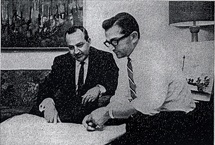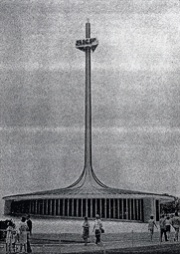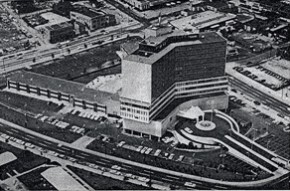|
Right around the corner from the General
Motor's Futurama in the heart of the World's Fair Transportation
Area, a soaring 82 foot tower proudly proclaims the presence
of SKF Industries, Incorporated, pavilion.
Frank Pisani, right, goes over some of the
finer points of an "in progress" drawing for his father,
Nicholas Pisani, at the architect's new East 78th Street offices.
 |
And beaming just as proudly these days is
Nicholas Pisani of the Statistical Reporting Section, Treasurer's
Department GMAC Executive Office. Nick, as he has been known
for the last 40 years, is the father of architect Frank A. Pisani,
AIA, who designed the pavilion which has been critically acclaimed
as one of the finest examples of pure exposition philosophy on
the fair grounds.
This is not the first time young Pisani has
graced these pages. In June of 1945, News and Views carried
a picture of "Frankie" who was an ice skating star
at 13 -- a protege of Carol Lynne, "Hats off to Ice"
feature attraction. Times have changed, however.
"Right now," said Frank, in a recent
interview, "this project and the three other Fair pavilions
I've had a part in, are the most important things that have ever
happened to me. Many of the important architects of today made
their reputation in the last (New York) fair."
Nick's son, a chip off the old block, grew
up "across the street from the 1939 fairgrounds," in
Queensborough Hill, Long Island. He was impressed with the buildings,
he said, "but I never dreamed of being an architect when
I was eight." Actually, he majored in art at the Manhattan
High School of Music and Art until his mentors discovered that
his drawings had an architectural flavor. With their urging,
he specialized in architecture his last three semesters and followed
with five years at Pratt Institute, winning his Bachelor of Architecture
degree.
After a hitch with the U. S. Department of
Topography at the Army Engineer School, Frank joined the firm
of I. M. Pei and Associates. There, and later with Welton Beckett,
FAIA and associates and with a colleague in private practice,
he gained wide experience as a project and associate engineer
before entering his own practice in New York City. In these projects
he took "responsible charge" of diverse activities
representing some $110 million of construction value.
In designing the SKF pavilion at the fair,
it was necessary to consider its purpose -- which was to expose
the public to "motion engineering" -- and to overcome
space limitations while keeping design in tune with the overall
theme of motion. With only 7,700 square feet to work in (compared
with GM's 304,000) the structure was conceived as a soaring tower
and "parasol", freed from and floating above the main
building by a band of tinted glass. Thus a feeling of motion
was established in the major architectural elements. Identification
was provided by the SKF logotype placed on the tower. The interior
of the pavilion was placed below grade to minimize the mass of
the structure. Since the audience attending the exhibit would
be drawn from traffic passing to and from GM and other shows
in the area, a broad, inviting access to the exhibit was provided,
oriented to the corner of the site and exposed to two crosswalks.
The remainder of the site was covered with a subtle roof form
which rises from 12 inches above grade and is sculptured to a
mound which focuses attention to and dramatizes the central tower
and "parasol."
The SKF Industries, Incorporated, pavilion
 |
To facilitate his work on the fair projects,
the firm of Pisani and Carlos Architects, was formed with Frank
being partner-in-charge of the exhibit. Pisani and Carlos were
the New York architects for the exhibit pavilion for Austria,
and the 32-year-old designer also handled the interior architecture
for the exhibits in the Coca Cola, Greyhound Bus and State of
Missouri pavilions.
Frank's work has not been limited to the World's
Fair. In association with Anthony Musolino of Washington, D.C.,
he can point with pride to the Golden Triangle Hotel in Norfolk,
the Northern Virginia Doctors' Hospital in Arlington, and the
Prototype Bowling Centers in Pittsburgh, Annandale and Richmond,
Virginia, as representative samples of his art. He has recently
completed the interior work on the recreational suite in the
offices of Allen Fundt of Candid Camera fame.
In association with Washington D. C. architect
Anthony Musolino, Francis Pisani designed the Golden Triangle
Motor Hotel, a new landmark in Norfolk, Virginia.
 |
Recently completed commissioned drawings include
the Maison Courbe' Apartment Hotel in Fort Lauderdale; a Community
"Y" in Ocean Township, New Jersey, and a night club
on Grand Bahama Isle.
One of Frank's ambitions is to do a school
for the City of New York, but it may be a very long wait. The
Mayor's panel of architects has a list of from two to three hundred
candidates! He would be satisfied, though, if he could obtain
a half dozen clients.
According to young Pisani, a good client is
one who is very strong about what a building should contain and
how much he can pay for it -- not what it should look
like. He feels that most clients are easily satisfied designwise;
in fact, the design is much more important to the architect because
with him good design is a matter of conscience; he has a reputation
to make.
A good building, according to Nick's son,
must combine aesthetic beauty with function within the allocated
budget. The most beautiful structure in the world would be valueless
were it not functional. He designs each one his buildings so
it expresses the function, and he believes today's modern
designs best express the functional.
His plans abound with modern innovations for,
as he puts it, "I'm definitely not an historian."
SOURCE: General Motors
News and Views, September, 1964, Presented courtesy Frank
Pisani's daughter, Celeste Pisani
|